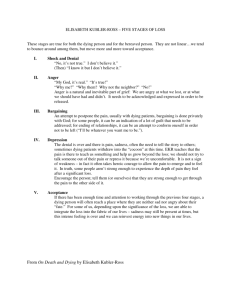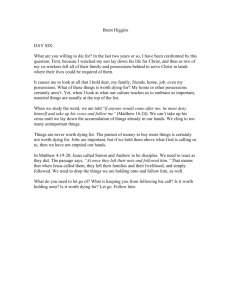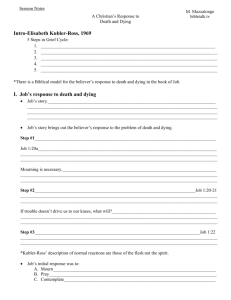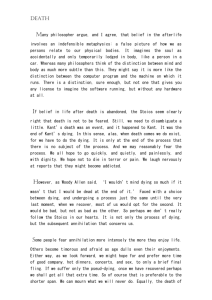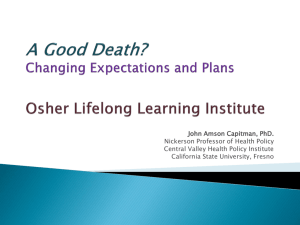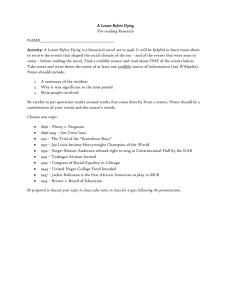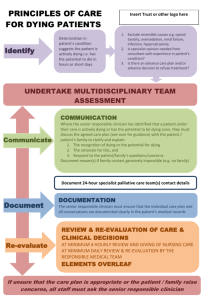class attendance - Mississippi College
advertisement
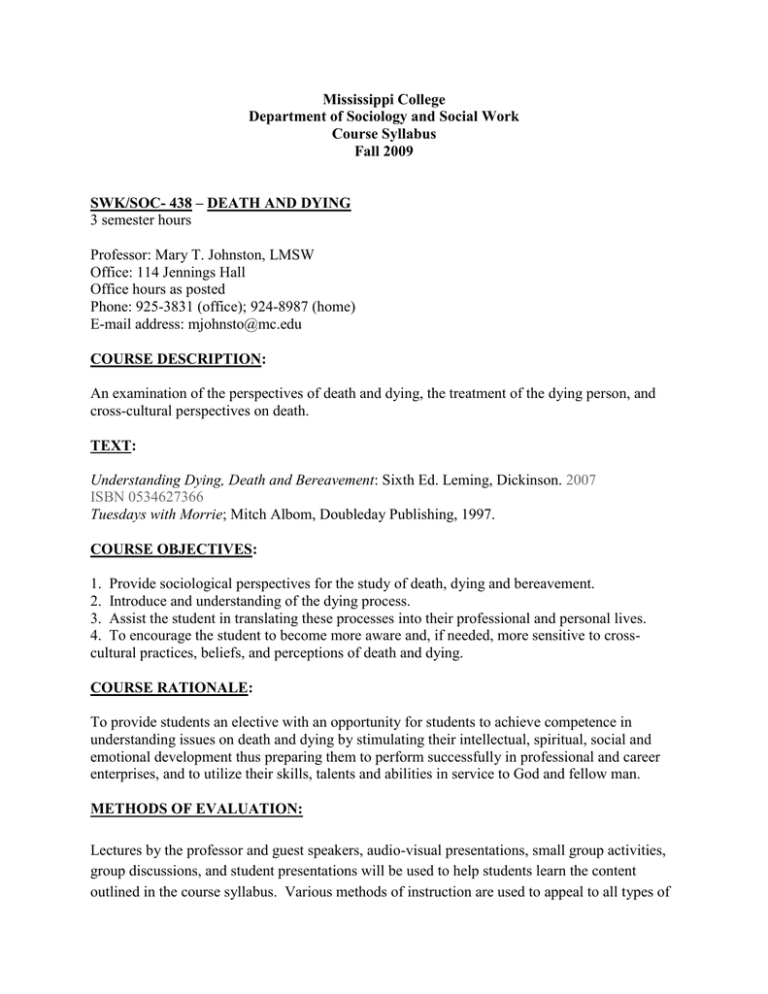
Mississippi College Department of Sociology and Social Work Course Syllabus Fall 2009 SWK/SOC- 438 – DEATH AND DYING 3 semester hours Professor: Mary T. Johnston, LMSW Office: 114 Jennings Hall Office hours as posted Phone: 925-3831 (office); 924-8987 (home) E-mail address: mjohnsto@mc.edu COURSE DESCRIPTION: An examination of the perspectives of death and dying, the treatment of the dying person, and cross-cultural perspectives on death. TEXT: Understanding Dying, Death and Bereavement: Sixth Ed. Leming, Dickinson. 2007 ISBN 0534627366 Tuesdays with Morrie; Mitch Albom, Doubleday Publishing, 1997. COURSE OBJECTIVES: 1. Provide sociological perspectives for the study of death, dying and bereavement. 2. Introduce and understanding of the dying process. 3. Assist the student in translating these processes into their professional and personal lives. 4. To encourage the student to become more aware and, if needed, more sensitive to crosscultural practices, beliefs, and perceptions of death and dying. COURSE RATIONALE: To provide students an elective with an opportunity for students to achieve competence in understanding issues on death and dying by stimulating their intellectual, spiritual, social and emotional development thus preparing them to perform successfully in professional and career enterprises, and to utilize their skills, talents and abilities in service to God and fellow man. METHODS OF EVALUATION: Lectures by the professor and guest speakers, audio-visual presentations, small group activities, group discussions, and student presentations will be used to help students learn the content outlined in the course syllabus. Various methods of instruction are used to appeal to all types of learning styles (visual, auditory, interactive, and kinesthetic). Small group activities and student presentations will assist students in developing effective critical thinking and communication skills. The class participation and grade requirements will help students develop discipline and personal responsibility. COURSE REQUIREMENTS: 1. Papers: (20% of final grade) Due Date: October 22. You will write a reaction paper, NOT A SUMMARY addressing the text, Tuesday with Morrie. Write a maximum of 4 quotes from the book and why it was significant to you. In your reaction to these quotes should explain how it relates to your own life experiences. This paper should be typed, double spaced and 4-6 pages long. 2. Group Project: (20% of final grade) Students will be grouped with 3-4 students (assigned by the professor) to make a presentation on different cultural/ethnic population groups and their perception of death and dying. Students will be graded on the following criteria: *Presentation: Do not stand and read your presentation to the class. Be familiar enough with the material to discuss it freely. *Creativity: Visual aids are encouraged but not limited to these. Guest speakers welcome. *Timing: Each presentation should be no less than 30 minutes in length. Handout: An outline of material presented should be given to each of your classmates. *Each student will be tested on these presentations on final exam. The dates for the presentations will be between November 19- December 3. 3. Research Paper: (20% of final grade) Due date: November 19 Students will write a research paper, typed in 12” font, 5-7 pages, double space, APA WRITING STYLE, on the topic that their group will be presenting in class. A minimum of 5 resources is required, no more than 2 internet sources. 4. Mid-Term Exam: (20% of final grade) Due date: October 13. 5. Final Exam: (20% of final grade) Due date: Tuesday, December 15, 2009 at 11:00. *Tests will be both objective i.e. multiple choice, T/F, etc. and subjective (discussion). There will be reviews before the tests. Students are responsible for content in assigned text. Additionally, students are responsible for class handouts, class discussion, class exercises and guest speakers. Coverage of content in text will be obtained primarily from reading, your review of your reading, questions and discussions in class with instructor and students, and reviews. GRADING SCALE 93 - 100 = A 85 - 92 = B 75 - 84 = C 69 - 74 = D CLASS ATTENDANCE Regular and punctual attendance is required of all students. In accordance with the College’s policy on class attendance, “any student whose absences, whether excused or unexcused, exceed 25% of the class meetings will receive a grade of “F” in the course. Therefore, in this course, any student exceeding (7) absences will receive a grade of “F”. It is the student’s responsibility to obtain any information and/or assignments covered during their absence from class. ACADEMIC INTEGRITY Refer to page 56 in the 2009-10 Mississippi College Undergraduate Catalog. SPECIAL NOTICE: The professor reserves the right to deviate from this syllabus at any given time. ADDITIONAL EXPECTATIONS: Cell Phones: The use of cell phones in class is strictly prohibited (text messaging, talking on the phone, entering calendar dates, etc.). During class, cell phones should be turned off or placed on silent mode. Laptops: The use of laptops in class is only to be used for note taking. Any other use, such as, internet, games, etc. is strictly prohibited and the student will be asked to close the computer for the duration of class. Make-up tests: Prior notice of a student’s absence is required if a student is going to miss any test or the due date of any assignment. If an emergency comes up and prior notice is not able to be given, contact with the professor needs to occur within that day of the absence. Only after the approval of the professor will a make-up date is assigned. ADA STATEMENT: Mississippi College students with documented disabilities that qualify under the Americans with Disabilities Act (ADA) may apply for services with the Counseling and Testing Center to determine eligibility for educational accommodations. Disabilities covered by the ADA may include, but are not limited to, learning, psychiatric, physical disabilities and /or chronic health disorder(s). Students must request accommodations each semester they are in attendance. For names and/or further assistance go to the Counseling and Testing Center located in Lowrey, Room 118, Telephone: 601 925-3354. COURSE OUTLINE: Understanding the interest in death and dying issues -Death education -Mortality statistics The American experience of death -Defining death -The meaning of death and dying -Attitudes toward death -Contemplating one’s own death Growing up with death -Childhood -Adolescence -Adulthood The Dying Process -Death meanings -Relating to the dying person -Dying with dignity Living with Dying -Understanding and Coping with illness -Palliative Care -The Hospice Movement Biomedical Issues and Euthanasia -Organ Transplantation -Euthanasia Suicide -Attitudes toward suicide -Social factors involved in suicide -Suicide throughout life cycle -Rational suicide The Business of Dying -The business of preparing the dead -Alternatives to the funeral -Cemeteries -Life Insurance The Legal aspects of Dying -Establishing the cause of death -Advance Directives -Disposition of Property Coping With Loss -The Bereavement Role -The Grieving Process -Coping with Violent Death Diversity in Death Rituals -Mourning Behaviors -Customs at Death -Death Rituals of Major Religious Groups

